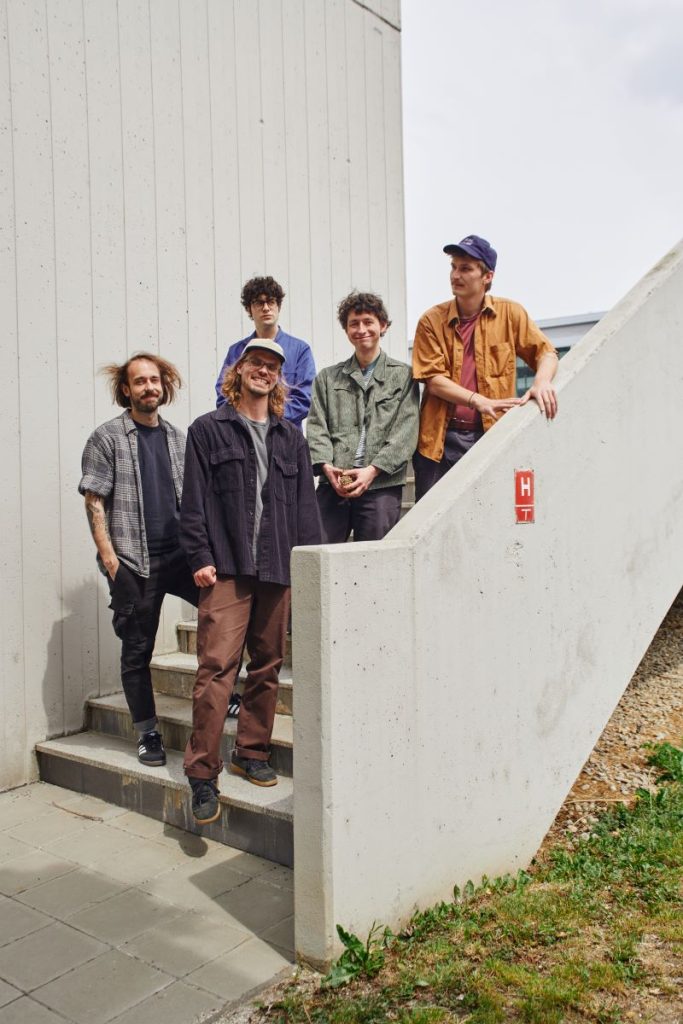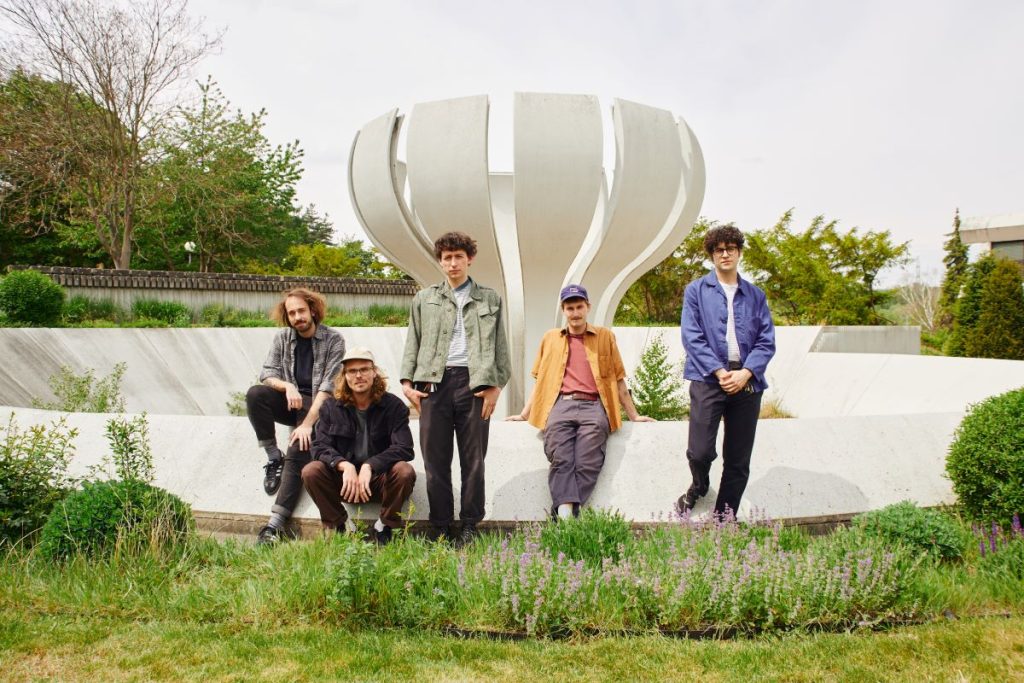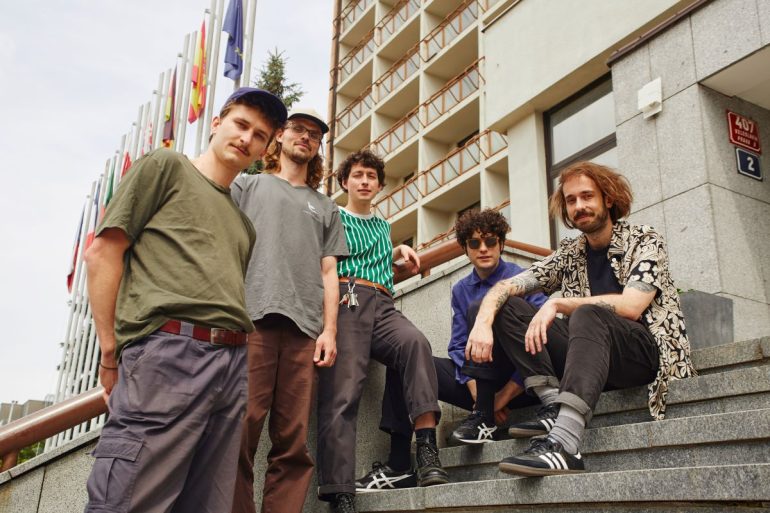Our series, “We are the night” presents artists, promoters, production managers, label owners and others who are bringing the music world of the Czech Republic forward, from the past to the present and the present to the future. This week we spoke to Prague-based indie outfit Island Mint.
Before Island Mint hit the road for the summer festival season, I wanted to know what it means to be an indie band nowadays in the Czech republic, a band not precisely included in any box except the one where the music is created, in vibrant emulation of the Prague scene.
I sat down with the band to find out about their roots, as well as their next steps, including their new video release.
BD: Who does what in the band?
- Matyáš Adámek – vocals, guitar
- Jakub Bolbol – guitar, backing vocals
- Honza Podskalský – synthesizers, backing vocals
- Ondra Lahoda – drums
- Tomáš Kovařík – bass
BD: Why Island Mint?
M: About the origin of the name, it just came into my mind and I thought it was a pretty combination of words that to me also captured the vibe of the music at the time.
BD: Where are you from?
M: I come from a small town called Jílové u Prahy, right next to Prague. I only lived there as a kid but I think it had a huge influence on me. I’ve been living in Prague for almost 20 years now but still haven’t quite come to terms with living in the city.
H: I come from Plzeň and moved to Prague about 8 years ago. My life back home was going in circles, so I found a new home here in Prague, where, while I still tend to move in circles, there are always new impressions along the way. I just love having so many different types of people around.
J: Born (not exactly) and raised in Prague.
BD: When did you guys meet and start playing together?
M: We met after I released our first EP ‘Hazy Days’. I recorded that EP with the help of the producer Mikuláš Roubíček, and then started to look for people to play live with. I knew Kuba from the band Branko’s Bridge, the others I found through friends’ recommendations – it was pretty random to be honest, but when we first started playing in this group, it felt great. We’ve been on it since 2021 and still going strong!
H: Those days around the end of lockdown were special, there was so much time and we made the best of it.
J: As Matyáš mentioned, I used to play in a band called Branko’s Bridge. We met through our mutual friend who played in Humdrum Lighthouse (Matyáš’s previous band) and spent some time talking about the Fender Jaguar at the festivals we both played.

BD: What where you previous band experiences?
M: I used to play in an indie band called Humdrum Lighthouse in high school. We mostly played in Prague and some small festivals, but the experience and knowledge of music production that I gained during that time is priceless.
H: When I was twelve I played trumpet and I joined a “dechovka” brass orchestra in Plzeň, I played with them until I was 19, so I grew up experiencing how 20 people together can make music come alive, and I forgot how to live without it. Then I started my first band Cold Meat Party (also an indie band) with my BFF Petr Jiskra, and later I joined Island Mint. So now I am learning how to manage a life and two bands.
J: I co-founded the Prague band Branko’s Bridge (which has been resurrected recently) in 2016/2017 and played in that until 2021. We were playing a lot (a little too much at times) around the country and managed to get to some big festivals (including Metronome and Rock for People). It was a great experience for me and hella fun, so I am glad I was able to be part of it.
BD: How would your label the music you create? Is it a scene that you feel is represented in the Czech Republic?
M: It’s just a mixture of everything I like, including elements of Psychedelic music, Indie rock/pop, country, Czech folk music, post-punk and krautrock… The label is up to you I guess. It’s a lot of different things mixed together. But tastefully, at least I hope so. If you find it hard to find a label for us, it only makes me happy.
H: This question haunts all the interviews and I sometimes feel it pushes artists to become a box, a label, rather than encouraged to just write music, songs, find their own style and let the listeners and music critics decide. I think musicians should be spared from this question forever. I’d leave the answer to the scientists.
J: I like all kinds of guitar music, so I like to think that I use all the influences I have (surf, psych rock, garage rock, post punk, etc.) to express myself through playing, even though we’re not specifically playing these genres. So yeah, I would label the music as such.
BD: What are the bands or scenes that inspires you the most? And what other influences do you have (cinema, literature etc.)?
M: I got deep into the Australian neo-psych scene rabbit hole a couple years ago. Bands like Pond, Tame Impala and King Gizzard continue to be a major influence to this day. It’s also so many other things though, like 90s britpop, 60s sunshine pop, lots of dreamy and shoegazey stuff. Some of my all-time favourite bands are Broadcast, Stereolab, My Bloody Valentine, Darkside, Mild High Club and Wilco.
H: My big inspiration would be Connan Mockasin and his live band. I once saw his show at MeetFactory in Prague, and there was so much interaction happening on-stage during the minimalist songs, and it sounded great. That became something I keep looking up to when I think about chemistry in a band.
J: I’ve been following what’s happening over in the UK a lot, the new post-punk wave has been in my Spotify rotation for some time (although now I’m getting a bit tired of it). Besides that, I am also a big fan of the Aussie psych scene, the US garage rock scene (Ty Segall and Thee Oh Sees were hugely influential to me) and synth based/IDM music. At the moment I am also in the process of discovering the gems of Czech folk music from the 90s and early 2000s.
BD: What is your process for composing songs?
M: I usually piece the song together from a couple ideas from voice memos on my phone. I make an Ableton project where I record the demo. Once I feel like the song is strong enough, we start the process of re-recording everything so that it sounds good. This is where the boys come in to record their instruments. So far we have been recording everything very DIY in whatever space we could find, usually just bedrooms or living rooms. I think it’s super fun to record this way and we learned a lot during the process. We now have a small studio in Prague, which we will use for the next album.
H: Yes, all the writing work on the music/lyrics is Matyáš’s. And I’m happy to be invited to play music in his song-universe.
J: Same as Honza.
BD: For now all your songs are in English. Why did you make this choice, and are you considering singing in Czech eventually?
M: I think it’s natural at the start to try and make the kind of music that you listen to. That’s why I started singing in English, there was never any doubt about it really. English is also a nice sounding language. Lately I’ve been thinking about writing in Czech, how fun it would be to explore songs from that perspective. But I think I’m gonna keep that for when I’m old and bored.
BD: What about your lyrical topics?
M: I’ve noticed most of my lyrics have some sort of aquatic theme, which is no coincidence as I love water. My lyrics tend to be very personal, I’m often trying to capture a certain state of mind as opposed to commenting on real world issues or politics, for example. I tend to think music is somehow superior to all of that.
BD: You’ve made several EPs and one LP. Can you describe the main differences you noticed in recording these two different formats?
M: The only difference is in the volume of content. With an album, you spend more time making it, which can get really tiring. It feels good to be releasing an album though, it’s like a complete piece of information compared to an EP, which just gives you a vague sense of what the band are trying to say. That’s the way I see it, anyway.
H: I think recording long albums is a way to build a deeper connection between you and the people who listen to you. Sometimes you just wanna do an EP so the listeners can keep up with where you are at the moment, sometimes you want to introduce it as a transition to a new direction in your music.
J: I am a big album listener so I get more immersed in the process of creating an album. As we were making [2022 LP] “Irreality”, we spent a whole week doing only guitars and it was a beautiful process. We were constantly changing instruments, pedals, amps, mic positions for different tracks to get the most bizarre and quirky sounds, so it was also a huge learning process in terms of the gear. Also, I love spending time with my bandmates and recording music, so bigger formats work for me.

BD: You played in Brno around when we started talking. Do you see any difference in the audience reactions between Prague and Brno?
M: Brno is the best. The people are always great there. Of course we have like ten times more fans in Prague which makes a difference, but we’ve always loved coming to Brno.
H: I’ve seen some fine dance moves in Brno, we always have so much fun there. J: Yes Brno is great, better pubs than in Prague PERIOD.
BD: Have you ever played abroad?
M: Yes. We have played in Germany four times, Slovakia four times, and this year we went to the Netherlands to play at the Eurosonic Showcase Festival.
H: We also played Budapest, Timisoara and Belgrade, which was the furthest tour so far, and there is a German tour coming up this autumn. We can’t wait, the plan is to get as far as Hamburg.
BD: Are you planning to play any festivals this summer?
M: Yes. We’re playing KAMEN!CE, Březiněfest, Vlčkovice, Beseda u Bigbítu, Grape (SK), Maringota (SK) and Moody Moon Noise. I’m especially looking forward to the last one, where we’ll play with Ecstasy of St. Theresa, a legendary Czech band that reunited after about 30 years.
H: Yeah, and right after that we are going to the SHIP showcase festival in Šibenik, Croatia. Finally somewhere by the seaside.
BD: What are the next main steps for the band?
M: Right now I’m finishing demos for another album, which we’ll start recording in the summer, to be released next year. Apart from that, we’ll be travelling around Europe playing clubs and showcase festivals and trying to grow an international audience.
BD: Can you name three songs your would like to share with our readers?
- M: Stereolab – Refractions in the Plastic Pulse
- H: Cindy Lee – Flesh and Blood
- J: The Bats – Made Up In Blue
You can watch Island Mint’s new video “Burnout” here, or follow them on Bandcamp or Instagram.






